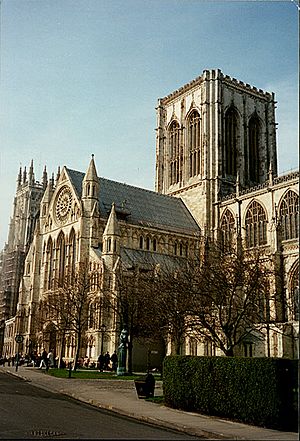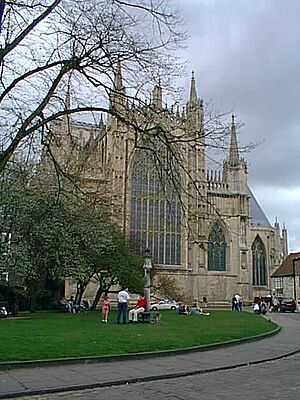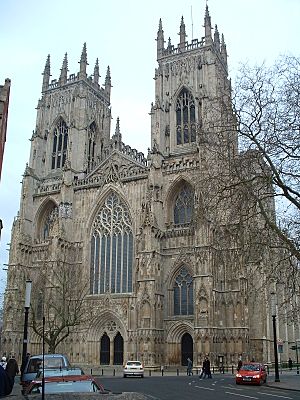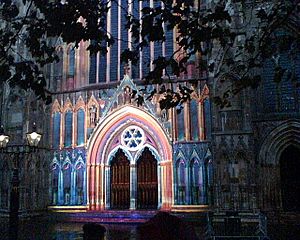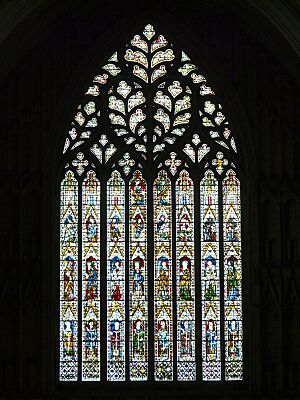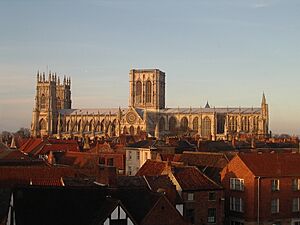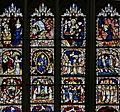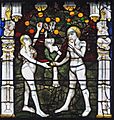York Minster facts for kids
York Minster is an amazing and very old church in the city of York, North Yorkshire, England. It is the biggest Gothic cathedral in Northern Europe. The word Minster means it was once an important teaching church during the time of the Anglo-Saxons.
York Minster is the main church for the Archbishop of York, who is the second most important bishop in the Church of England. A group called the 'Chapter' helps run the Minster, led by the Dean of York.
Contents
The Amazing Architecture of York Minster
The design of York Minster is a style called English Gothic architecture. It shows different periods of this style, from Early English (around 1270) to Perpendicular (around 1472). The main part of the church, called the nave (where people sit), is wide and built in the Decorated Gothic style. The 'quire' (choir) and other parts like the east end and the north and south transepts are also in a similar beautiful style.
Stunning Stained Glass Windows
York Minster is famous for its incredible stained glass windows. Some of these windows are over 800 years old! The Great East Window, finished in 1408, is one of the biggest areas of medieval stained glass in the world. It was made by a master artist named John Thornton.
In the north transept, you'll find the Five Sisters Window. Each of its narrow windows is over 16 meters (52 feet) tall! The south transept has the well-known Rose window. In total, the Minster has 128 stained glass windows, made up of about 2 million pieces of glass. Many of these pieces were carefully taken out and put back together after the First and Second World Wars to protect them.
Towers and Bells
The Minster's towers hold many bells. There are seven clock bells, 14 bells for change ringing (a special way of ringing bells), and 22 carillon bells. The carillon bells can be played like a keyboard. The biggest bell is called Great Peter, and it weighs about 10.8 tons. It rings to tell the hour.
A Look at York Minster's History
Christianity has been present in York since the 300s. The very first church on this spot was a simple wooden building. It was quickly built in 627 so that Edwin, the King of Northumbria, could be baptized. A stronger stone church was finished in 637 and was dedicated to Saint Peter. This early church also had a school and a library.
In 741, a fire destroyed the church. It was rebuilt even bigger, with thirty altars. Over time, the church and the area were controlled by Norse invaders. In 1066, the archbishop Ealdred traveled to Westminster Abbey to crown William.
The church was damaged again in 1069. The first Norman archbishop arrived in 1070 and started repairs. But in 1075, the Danes destroyed it. It was rebuilt once more starting in 1080, this time in the Norman style. This new building was 111 meters (364 feet) long. It was damaged by fire in 1137 but repaired quickly.
The new Gothic style became popular in cathedrals in the mid-12th century. In 1215, Walter de Gray became archbishop. He wanted a Gothic church that could be as grand as Canterbury Cathedral. Building began in 1220, and the cathedral was finally finished and opened in 1472.
During the English Reformation, the church changed from being Roman Catholic to Anglican. Some of the church's valuable items were taken by the Crown, and it lost some of its land. Under Elizabeth I, efforts were made to remove all signs of the Roman Catholic Church from the cathedral, which unfortunately led to the destruction of tombs, windows, and altars. During the English Civil War, the city was attacked, but Thomas Fairfax made sure no more damage happened to the cathedral.
Images for kids
-
The chapter house
-
The Great West Window (1338–39), known as "The Heart of Yorkshire", with curvilinear tracery in the Decorated style
-
The Great East Window of York Minster, "Apocalypse" (1405-1408) in the Perpendicular style
See also
 In Spanish: Catedral de York para niños
In Spanish: Catedral de York para niños


